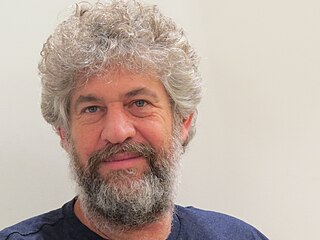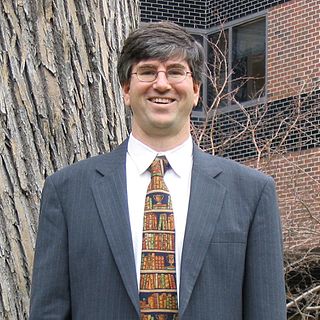Related Research Articles
The ACM A. M. Turing Award is an annual prize given by the Association for Computing Machinery (ACM) for contributions of lasting and major technical importance to computer science. It is generally recognized as the highest distinction in computer science and is colloquially known as or often referred to as the "Nobel Prize of Computing".

Preference regression is a statistical technique used by marketers to determine consumers’ preferred core benefits. It usually supplements product positioning techniques like multi dimensional scaling or factor analysis and is used to create ideal vectors on perceptual maps.

Collaborative filtering (CF) is a technique used by recommender systems. Collaborative filtering has two senses, a narrow one and a more general one.
A recommender system, or a recommendation system, is a subclass of information filtering system that provide suggestions for items that are most pertinent to a particular user. Typically, the suggestions refer to various decision-making processes, such as what product to purchase, what music to listen to, or what online news to read. Recommender systems are particularly useful when an individual needs to choose an item from a potentially overwhelming number of items that a service may offer.
The Gödel Prize is an annual prize for outstanding papers in the area of theoretical computer science, given jointly by the European Association for Theoretical Computer Science (EATCS) and the Association for Computing Machinery Special Interest Group on Algorithms and Computational Theory. The award is named in honor of Kurt Gödel. Gödel's connection to theoretical computer science is that he was the first to mention the "P versus NP" question, in a 1956 letter to John von Neumann in which Gödel asked whether a certain NP-complete problem could be solved in quadratic or linear time.
Cold start is a potential problem in computer-based information systems which involves a degree of automated data modelling. Specifically, it concerns the issue that the system cannot draw any inferences for users or items about which it has not yet gathered sufficient information.
The Netflix Prize was an open competition for the best collaborative filtering algorithm to predict user ratings for films, based on previous ratings without any other information about the users or films, i.e. without the users being identified except by numbers assigned for the contest.

The Annual ACM Symposium on Theory of Computing (STOC) is an academic conference in the field of theoretical computer science. STOC has been organized annually since 1969, typically in May or June; the conference is sponsored by the Association for Computing Machinery special interest group SIGACT. Acceptance rate of STOC, averaged from 1970 to 2012, is 31%, with the rate of 29% in 2012.

Gábor Tardos is a Hungarian mathematician, currently a professor at Central European University and previously a Canada Research Chair at Simon Fraser University. He works mainly in combinatorics and computer science. He is the younger brother of Éva Tardos.

Noam Nisan is an Israeli computer scientist, a professor of computer science at the Hebrew University of Jerusalem. He is known for his research in computational complexity theory and algorithmic game theory.
Subhash Suri is an Indian-American computer scientist, a professor at the University of California, Santa Barbara. He is known for his research in computational geometry, computer networks, and algorithmic game theory.

John Thomas Riedl was an American computer scientist and the McKnight Distinguished Professor at the University of Minnesota. His published works include highly influential research on the social web, recommendation systems, and collaborative systems.
Social media mining is the process of obtaining big data from user-generated content on social media sites and mobile apps in order to extract actionable patterns, form conclusions about users, and act upon the information, often for the purpose of advertising to users or conducting research. The term is an analogy to the resource extraction process of mining for rare minerals. Resource extraction mining requires mining companies to shift through vast quantities of raw ore to find the precious minerals; likewise, social media mining requires human data analysts and automated software programs to shift through massive amounts of raw social media data in order to discern patterns and trends relating to social media usage, online behaviours, sharing of content, connections between individuals, online buying behaviour, and more. These patterns and trends are of interest to companies, governments and not-for-profit organizations, as these organizations can use these patterns and trends to design their strategies or introduce new programs, new products, processes or services.
Panagiotis Kalnis is a Greek academic who specializes in cloud computing and databases.
Matrix factorization is a class of collaborative filtering algorithms used in recommender systems. Matrix factorization algorithms work by decomposing the user-item interaction matrix into the product of two lower dimensionality rectangular matrices. This family of methods became widely known during the Netflix prize challenge due to its effectiveness as reported by Simon Funk in his 2006 blog post, where he shared his findings with the research community. The prediction results can be improved by assigning different regularization weights to the latent factors based on items' popularity and users' activeness.

Matthias Grossglauser is a Swiss communication engineer. He is a professor of computer science at EPFL and co-director of the Information and Network Dynamics Laboratory (INDY) at EPFL's School of Computer and Communication Sciences School of Basic Sciences.
ACM Conference on Recommender Systems is a peer-reviewed academic conference series about recommender systems. Sponsored by the Association for Computing Machinery. This conference series focuses on issues such as algorithms, machine learning, human-computer interaction, and data science from a multi-disciplinary perspective. The conference community includes computer scientists, statisticians, social scientists, psychologists, and others.

Edward Y. Chang is a computer scientist, academic, and author. He is an adjunct professor of Computer Science at Stanford University, and Visiting Chair Professor of Bioinformatics and Medical Engineering at Asia University, since 2019.
Learned sparse retrieval or sparse neural search is an approach to text search which uses a sparse vector representation of queries and documents. It borrows techniques both from lexical bag-of-words and vector embedding algorithms, and is claimed to perform better than either alone. The best-known sparse neural search systems are SPLADE and its successor SPLADE v2. Others include DeepCT, uniCOIL, EPIC, DeepImpact, TILDE and TILDEv2, Sparta, SPLADE-max, and DistilSPLADE-max.
References
- ↑ "How Hedge Funds Rate Wall Street Analysts, 2003".
- ↑ Hafner, Katie (June 4, 2007). "Netflix Prize Still Awaits a Movie Seer". The New York Times . Retrieved 2010-03-07.
- ↑ "The Ensemble". 2009-07-25.
- ↑ "Grand Prize awarded to team BellKor's Pragmatic Chaos". Netflix Prize Forum. 2009-09-21. Archived from the original on 2012-05-07. Retrieved 2012-05-07.
- ↑ Steve Lohr (2009-09-21). "A $1 Million Research Bargain for Netflix, and Maybe a Model for Others". New York Times.
- ↑ "Mátrixfaktorizáció egymillió dollárért". Index. 2009-08-07.
- ↑ Takács, G. B.; Pilászy, I. N.; Németh, B. N.; Tikk, D. (2007). "Major components of the gravity recommendation system". ACM SIGKDD Explorations Newsletter. 9 (2): 80. doi:10.1145/1345448.1345466. S2CID 4518283.
- ↑ Gábor Takács; István Pilászy; Bottyán Németh; Domonkos Tikk (2007), "On the Gravity Recommendation System" (PDF), in Gábor Takács; István Pilászy; Bottyán Németh and Domonkos Tikk (eds.), Proc. KDD Cup Workshop at SIGKDD, San Jose, California, pp. 22–30, retrieved 2010-04-15
{{citation}}: CS1 maint: location missing publisher (link) - ↑ Gábor Takács; István Pilászy; Bottyán Németh; Domonkos Tikk (2009), Scalable Collaborative Filtering Approaches for Large Recommender Systems (PDF)
- ↑ USpatent 8676736,Pilaszy, et al.,"Recommender systems and methods using modified alternating least squares algorithm",issued 2014-03-18
- ↑ István Pilászy; Domonkos Tikk (2009), "Recommending new movies: Even a few ratings are more valuable than metadata", Proceedings of the third ACM conference on Recommender systems, RecSys '09, pp. 93–100, doi:10.1145/1639714.1639731, ISBN 978-1-60558-435-5, S2CID 17687390
- ↑ István Pilászy; Dávid Zibriczky; Domonkos Tikk (2010), "Fast ALS-based matrix factorization for explicit and implicit feedback datasets", Proceedings of the fourth ACM conference on Recommender systems - Rec Sys '10, RecSys '10, pp. 71–78, doi:10.1145/1864708.1864726, ISBN 978-1-60558-906-0, S2CID 1816937
- ↑ Gábor Takács; István Pilászy; Domonkos Tikk (2011), "Applications of the conjugate gradient method for implicit feedback collaborative filtering", Proceedings of the fifth ACM conference on Recommender systems - Rec Sys '11, RecSys '11, pp. 297–300, doi:10.1145/2043932.2043987, ISBN 978-1-4503-0683-6, S2CID 3342766
- ↑ Balázs Hidasi; Domonkos Tikk (2012), "Fast ALS-Based Tensor Factorization for Context-Aware Recommendation from Implicit Feedback", Machine Learning and Knowledge Discovery in Databases, Lecture Notes in Computer Science, vol. 7524, pp. 67–82, arXiv: 1204.1259 , doi:10.1007/978-3-642-33486-3_5, ISBN 978-3-642-33485-6, S2CID 9480129
- ↑ Gábor Takács; Domonkos Tikk (2012), "Alternating least squares for personalized ranking", Proceedings of the sixth ACM conference on Recommender systems - Rec Sys '12, RecSys '12, pp. 83–90, doi:10.1145/2365952.2365972, ISBN 978-1-4503-1270-7, S2CID 3357762
- ↑ Balázs Hidasi; Domonkos Tikk (2013), "Context-aware item-to-item recommendation within the factorization framework", Proceedings of the 3rd Workshop on Context-awareness in Retrieval and Recommendation - CaRR '13, pp. 19–25, doi:10.1145/2442670.2442675, ISBN 978-1-4503-1847-1, S2CID 14906053
- ↑ Alan Said; Domonkos Tikk; Paolo Cremonesi (2014), "Benchmarking: A Methodology for Ensuring the Relative Quality of Recommendation Systems in Software Engineering", Recommendation Systems in Software Engineering, pp. 275–300, doi:10.1007/978-3-642-45135-5_11, hdl:11311/1006649, ISBN 978-3-642-45134-8, S2CID 38607259
- ↑ Balázs Hidasi; Domonkos Tikk (2014), "Approximate modeling of continuous context in factorization algorithms", Proceedings of the 4th Workshop on Context-Awareness in Retrieval and Recommendation, pp. 3–9, doi:10.1145/2601301.2601303, ISBN 9781450327237, S2CID 17842678